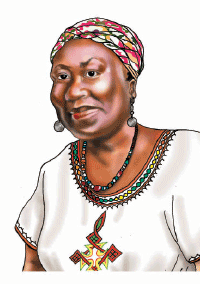The justified uproar occasioned by President Muhammadu Buhari’s denigrating statement on Nigerian youth made recently at the Commonwealth Business Forum in London is one that should not die down too quickly.
The President, while answering a question relating to business opportunities in North-East Nigeria and the Continental Free Trade Agreement which Nigeria refused to sign, apparently went off on a tangent and chose, instead, to talk about the young people of Nigeria in a manner which must have surprised his audience.
The President’s answer to the question asked included the following: “We have a very young population; our population is estimated conservatively to be 180 million. More than 60 per cent of the population is below the age of 30. A lot of them have not been to school and they are claiming that Nigeria has been an oil producing country, therefore they should sit and do nothing and get housing, healthcare and education free.”
Many Nigerians have reacted to this unwarranted slight on the globally recognised, enterprising young people of Nigeria with anger. ‘Lazy’ is not an adjective commonly used to describe Nigerians in general, and certainly not our young people who are making their mark in various fields of enterprise. You can call them ingenious, violent, dubious, deceptive, fun-loving, extravagant, cunning, whatever; but not lazy. President Buhari has frequently been accused of having lost touch with his people; this is clearly another example of the disconnect.
How can anyone who plies Nigerian streets accuse the young people of the land of laziness? Are they not seen struggling daily to eke out a living for themselves, in spite of the harsh conditions foisted upon them by their leaders? They toil all day in the sun as vulcanisers, tailors (carrying their sewing machines on their shoulder), food vendors pushing wheelbarrows, recharge card sellers, etc. The young men and women who weave in and out among vehicles on our major roads, endangering their lives and those of the motorists, run as if in a 100-meter Olympic competition just to make a N100 sale.
President Buhari has added insult to injury. It is the responsibility of the state to ensure that children are schooled; our President sounded like the blame for not going to school should be laid at the feet of our young people. What has he done since 2015 to begin to turn around the appalling educational state of the northern part of Nigeria? The former Governor of the Central Bank and now Emir of Kano, Alhaji Muhammadu Sanusi, has been a strong voice in the nation, constantly seeking to challenge the North on the very sorry state of education, and in particular, that of the girl-child, in that part of the country.
An equally troubling aspect of the matter is the obvious penchant in President Buhari for speaking disparagingly of Nigerians, especially when outside the country. How could we ever forget his 2016 comment that his wife belonged to “the kitchen, the living room and the other room”, making this shameful pronouncement in Germany while standing right next to Mrs. Angela Merckel, arguably the world’s most powerful woman (at that time)? Thus, while the rest of the world may very well have their women become leaders in various spheres of endeavour, the women of Nigeria (for that is the generalisation one is bound to make) are only fit for domestic services?
Let us probe this further. The reality, in fact, is that these assertions by our President are not true. His wife, we know, has not been confined to the kitchen and the other room; she is recognised as an accomplished beautician, and has even published a book. Also, in the clarification made by the Presidency on the “deliberate misinterpretation” of the President’s statement which some Nigerians apparently delight in, Mr. Femi Adesina countered by saying that President Buhari has often celebrated young Nigerians who excelled in various spheres of endeavour.
The troubling question, then, is the following: Why is the President disdainful of Nigerians in spite of evidence to the contrary? Is there something he holds against us? Could it be because we had him contest four times before finally being elected? Or has he always been this way – even as a military head of state?
The real issue, however, is that no matter what underlying grouses they might hold against their people, presidents do not generally and are not expected to speak in a disdainful, denigrating and demeaning manner about the people they lead, least of all when in a foreign country. If we have to teach this obvious fact to our President, then the reality we must face up to is that we have chosen the wrong person to occupy that position.
The Presidency, seeking to douse the fire ignited, claims that the current administration is actually very concerned about the plight of the youth, and that its identified focal areas of securing the country, reviving the economy and fighting corruption are actually intended to give the youth a future and a hope. Moreover, the “insistence on probity is equally to encourage people to be accountable, and accept honesty as a lifestyle so as to secure the future of our youths”. Nigerian youth, according to the spokesperson of the President, “deserve to inherit a stable and prosperous country that they can be proud of”.
If that is what President Buhari truly believes, deep down within him, then his comment about Nigerian youth being lazy and entitled remains a mystery. One must wonder where it came from.











